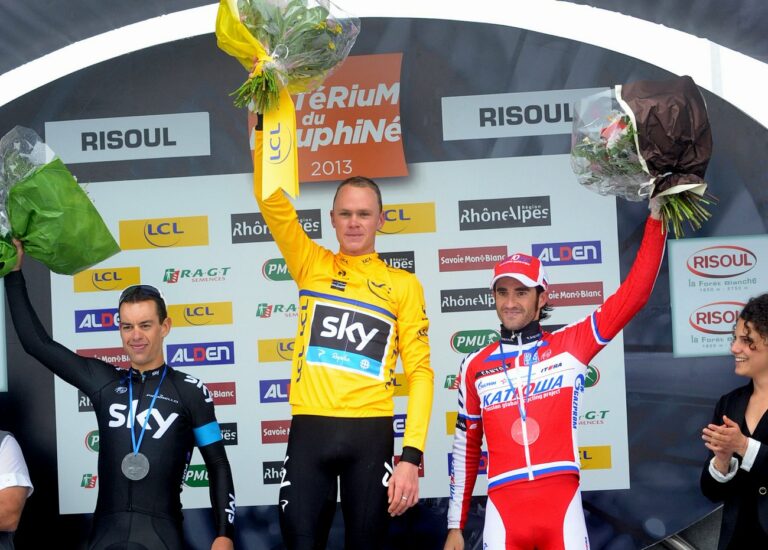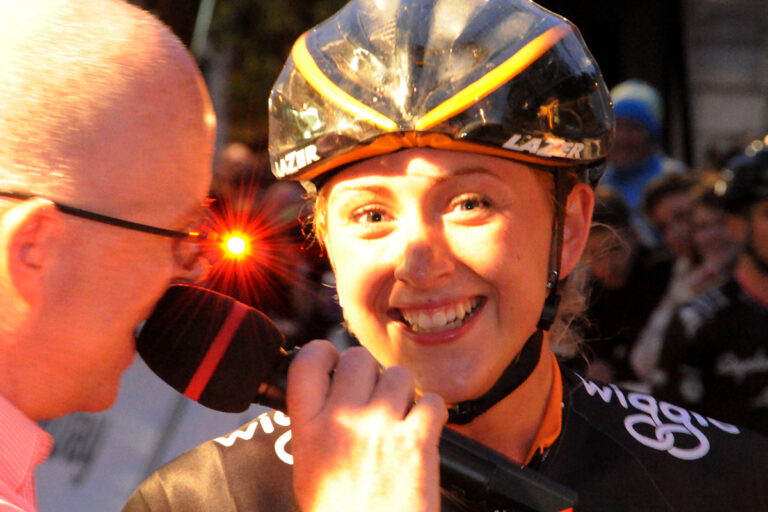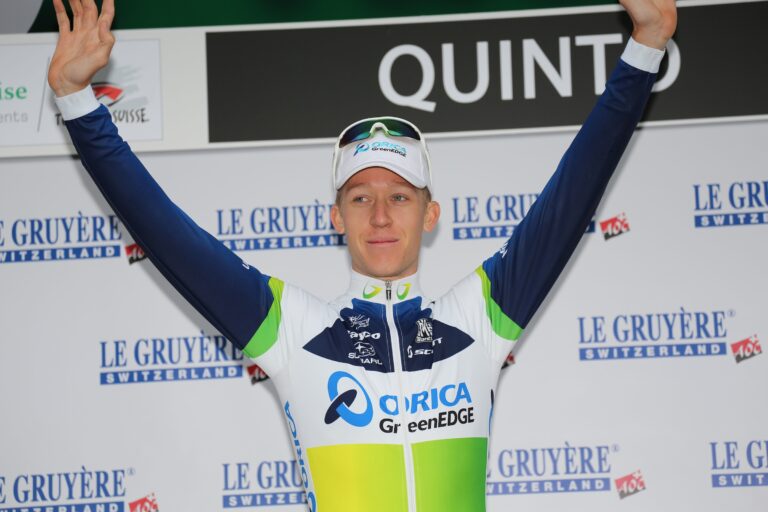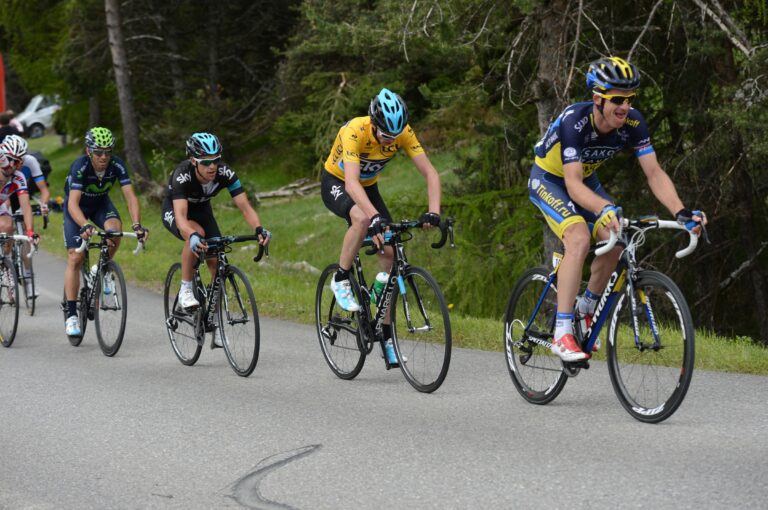A week may be a long time in politics, but in the infinitely more demanding world of a Grand Tour, it must seem even longer.
As the riders pause for thought on this first rest day of the 2013 Giro d’Italia, they will reflect on nine stages that have brought surprise, elation, and, if not quite disaster, then significant setbacks for at least two of the men expected to contend for overall victory.
On the six stages between now and the second rest day next Monday (May 20), what might be called the ‘week two’, the riders will tackle three mountain stages: challenges sure to offer even more drama than an enthralling first week.
Here are five observations on the opening nine stages of the 96th corsa rosa.
1) Can Wiggins still win?

Is Bradley Wiggins (Team Sky) still a legitimate contender for the 2013 Giro d’Italia after arriving at the first rest day 1.16” in arrears on GC to chief rival, Vincenzo Nibali (Astana)? Only his most blindly optimistic supporters would still afford the Tour de France champion the status of joint favourite after an opening week marred by crashes and mechanicals.
The more than marginal gains made by Sky’s victory in the team time trial on stage two were squandered the following day when Wiggins failed to sprint for the line with his GC rivals, notably Cadel Evans (BMC Racing), who collected a 12-second bonus for finishing second, and defending champion, Ryder Hesjedal (Garmin-Sharp), who collected eight seconds for finishing third. If Wiggins was hoping to delay his ascension to the maglia rosa, the calculation now looks misguided at best, arrogant at worst.
On stage four Wiggins lost time after being caught on the wrong side of a split in the bunch, and on stage seven crashed on the final descent. Stage eight saw a bid for a first victory of a barren 2013 campaign wrecked by a bike change. More significantly, this further misfortune came ahead of the finest display of time trialing yet produced by Nibali, who finished fourth, just 11 seconds down on second-placed Wiggins.
If Wiggins was hoping to delay his ascension to the maglia rosa, the calculation now looks misguided at best, arrogant at worst
Stage nine brought more difficulty on wet descents that distanced him from Nibali’s maglia rosa group, though it is a testament to Team Sky that Wiggins was dragged back to the leaders before the day’s close of business in Florence.
Where does he go from here? A lead of 1.16” heading into the mountainous second week would have been the least of Wiggins’ pre-race ambitions. Instead, he carries the same amount in deficit to Nibali as the terrain swings in the Italian’s favour. While gaining time on the Astana leader in the mountains seems unrealistic, such is Nibali’s superiority on the climbs, it is not inconceivable that the Sicilian could suffer misfortunes of his own. Wiggins, however, no longer has the luxury of allowing events to dictate the course of the race. He must do so himself.
2) Nibali the ‘tester’
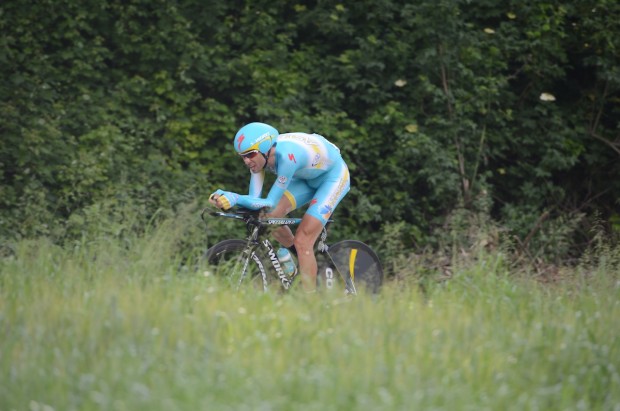
Vincenzo Nibali lost a staggering 3.52 to Bradley Wiggins on the final time trial of the 2012 Tour de France from Bonneval to Chartres, an experience that clearly stung the Italian. RoadCyclingUK understands he applied himself diligently to the task of improving his time trial position during velodrome tests with engineers from Specialized following his move to Astana.
No one who witnessed his descent from the Poggio in last year’s Milan-San Remo, or from the Cote St Nicolas in the following Liege-Bastogne-Liege, will have questioned Nibali’s bike handling skills, but until recently he has been unable to apply them to his time trial bike. Until now. Watching the Italian throw his machine through the highly technical opening sector of the stage eight test Saturday revealed a new level of competence with a low-profile steed, and despite constant minor corrections to his position on the saddle, he remained solid when the road straightened and finally rose.
RCUK understands Nibali applied himself diligently to the task of improving his time trial position during velodrome tests with engineers from Specialized
Niabli may never be a natural time trialist, perhaps any more than Wiggins will be a natural climber, but his transformation this season in tests against the clock, first glimpsed on stage seven of Tirreno-Adriatico, where he finished just 11 seconds behind fourth-placed Chris Froome, depriving the Team Sky leader of overall victory, mirrors Wiggins’ breakthrough on the climbs of 2009. The Londoner should still hold the edge on the Giro’s second test, but he cannot expect to dominate Nibali as at Chartres.
3) The rejuvenation of Cadel Evans

There can be little doubt that Cadel Evans (BMC Racing) has returned to his best form since winning the 2011 Tour de France. He announced before the Giro that he would be racing to win and those who still believe he is engaged upon a form-finding mission for the Tour must now find themselves in dwindling company.
The Australian showed his hand as early as stage three, charging for the line in the wake of stage winner, Luca Paolini (Katusha), and gaining a crucial 12-second time bonus. A further display of rejuvenation came in the stage eight time trial, when he alone of the GC contenders remained out of the saddle on the final climb of a grueling 54.8km test.
With the red jersey of points leader on his back, wrested from the shoulders of Mark Cavendish (Omega Pharma-QuickStep), the 2010 world road race champion is back to his best and now cannot be discounted from contending for overall victory.
4) Cavendish drives his own train

The OPQS lead out train continues to exhibit poor reliability, but the driver remains as competent as ever. This year’s Giro is short on sprint stages but Cavendish has already claimed two of them. The irony of moving from Sky to a team where he would enjoy the support of a lead out train appears lost on Cavendish, but with the Manx Missile clearly in a happier place than he was 12 months ago, another stage win seems assured. Last year, Cavendish left the Giro with three stage victories in his pocket. He has bagged two this year in the first week alone.
5) Rain
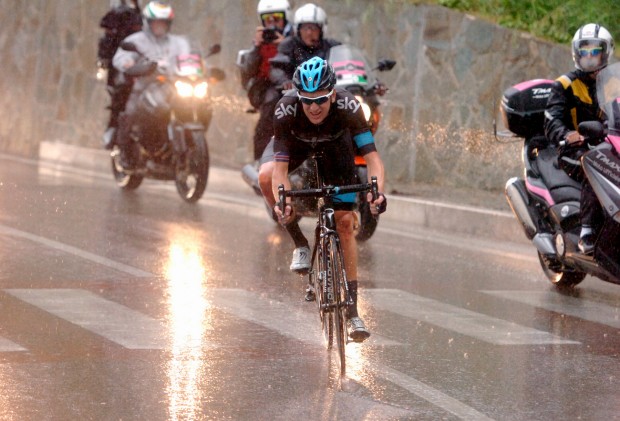
The two impeccable sources we quizzed before the race on the likely fortunes of Wiggins – 1987 winner, Stephen Roche, and 2009 podium finisher, Carlos Sastre – both raised the spectre of the weather. The Giro’s climes, traditionally less inviting than those of the Tour, have lived up to their infamous billing, and had more than a passing effect on the race. Wiggins has suffered more than most riding downhill on slippery surfaces, crashing on stage seven. A competent descender in the dry, the Londoner’s relative lack of experience has cost him dear. Expect to see Nibali, the best of them all on a downward gradient, seek to press his advantage on stages ten and eleven if the rain continues.


